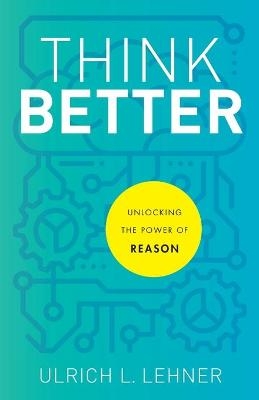
Think Better – Unlocking the Power of Reason
Baker Academic, Div of Baker Publishing Group (Verlag)
978-1-5409-6476-2 (ISBN)
In a world dominated by half-truths, illogic, and intellectual laziness, Think Better helps readers understand what reason is and how to use it well.
Reason is a powerful tool not only for finding our way in an increasingly complex world but also for growing intellectually and emotionally. This short, accessible volume unlocks the dynamics of human reason, helping readers to think critically and to use reason confidently to solve problems. It enables readers to think more clearly and precisely about the world, and it tackles a number of profound philosophical questions without getting bogged down with jargon. Topics include knowledge, identity, leadership, creativity, and empathy.
Written in an accessible style that integrates philosophy, illustrations, personal anecdotes, and statistical data, this book is well suited for use in undergraduate, classical school, and home school contexts. It is an invaluable guide for anyone interested in gaining better reasoning skills and a more rational approach to life.
Ulrich L. Lehner (PhD, University of Regensburg; DHabil, Central European University) is the William K. Warren Professor of Theology at the University of Notre Dame in Notre Dame, Indiana. He is a trained philosopher, theologian, and historian and has published widely on the history of religion, culture, and thought. Among his more than 20 authored and edited books is the bestseller God Is Not Nice and the groundbreaking Catholic Enlightenment. Lehner lectures at universities worldwide and is frequently interviewed in the media. He has been featured on CNN and in the Washington Post and the National Review.
Contents
Introduction: Empowering Minds
1. Knowledge Is the Basis of Good Reasoning
Knowledge Is Conversational
How to Train Your Will, or When It Is Better to Shut Up
2. Have Realistic Goals and Humility
Knowing Always Desires Truth
Knowledge and Incompetence
Knowledge Is Not Piecemeal but Holistic
3. The Power of Reason and Eternity
Where Do We Find Natural Laws?
Laws Are Ghosts from Another World
4. Knowing Yourself Is the Key to Logical Thinking
The Principle of Identity
Becoming Mindful of Your Surroundings
Objects Teach Us about Reality
Finding Relationships between Objects
Nothingness Is Your Invention
5. Good Thinking Is Always Focused
My Thinking Is Not Identical with Brain Events
Thinking Is Not Feeling
Thinking Abstract Things
Order for Our Thinking: Genus and Species
Our Mind Is Not Inventing "Justice"
The Tools of Thinking Are Analysis and Synthesis
Beware of Bad Comparisons and Analogies
6. Critical Thinking
Be Active and Not Passive
Cutting through Nonsense
You Know What Is Good Evidence
Trust Is Not Uncritical
Distrust and Illiteracy Are the Problems!
Overcoming Confirmation Bias
7. Without Order There Is No Good Reasoning
A Grid Brings Order
Thinking Coherently Takes Effort
8. Ignorance Is Not Bliss
Ignorance as a Moral Weakness
Better Thinking Can Save Our Failing Society
Overcoming Ignorance Drives Innovation
9. Real Thinking Sets You Free
Freedom and Reason Need Each Other
Is My Experience of Freedom Reliable?
Save Your Freedom by Thinking
Freedom Is More Than Choice
The Pinnacle of Freedom Is Forgiveness
10. Thinking Happens in a Soul, Not a Computer
Don't Get Robbed of Your First-Person Experience
Your Brain Is Not a Computer
Immaterial Matter and the Soul
Can Matter Produce Mind?
Personal Identity and Soul
11. Majority Rules Don't "Make" Truth
The Principle of Noncontradiction
Can I Be a Skeptic?
How Many Does It Take?
12. Real Thinking Discovers Causes
The Classic Four Causes
Do Things Just Pop into Existence?
Coming into Existence Needs a Cause
Do Things Pop out of Existence?
Potency and Change
13. Thinking about Goods, Values, and Morality
Emotions Are Not about Truth
The Rational Foundation of Morality
14. Thinking Saves Lives
Intentional Perception
Disputing Irrational Beliefs
15. Empathy Is Achieved by Hard Thinking
Walking in Somebody Else's Shoes
Self-Awareness Is Needed for Empathy
Thinking about Emotions
16. Leadership, Values, and Your Thoughts
Characteristics of Leadership
Ubuntu as a Key to Moral Leadership
Recognizing and Hearing the Other
17. Creative Thinking Is Not a Mystery
Divergence, Convergence, and Lateral Thinking
Overcoming Mental Blocks
How to Become Creative
18. Reasoning Helps Us Find Unity in a Divided World
Connectedness and Personhood
Giving All a "Home"
Unity in Diversity
Index
| Erscheinungsdatum | 02.11.2021 |
|---|---|
| Verlagsort | Ada, MI |
| Sprache | englisch |
| Maße | 141 x 214 mm |
| Gewicht | 236 g |
| Themenwelt | Geisteswissenschaften ► Psychologie ► Allgemeine Psychologie |
| Geisteswissenschaften ► Psychologie ► Verhaltenstherapie | |
| ISBN-10 | 1-5409-6476-0 / 1540964760 |
| ISBN-13 | 978-1-5409-6476-2 / 9781540964762 |
| Zustand | Neuware |
| Informationen gemäß Produktsicherheitsverordnung (GPSR) | |
| Haben Sie eine Frage zum Produkt? |
aus dem Bereich


